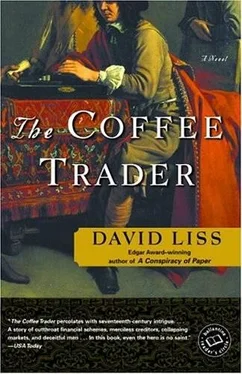“The thing of it is,” Miguel said hesitantly, “I cannot make any moves in my own name-owing to some small debts. If these niggling creditors were to learn of the business, they might make demands on me that could prove disruptive.”
“Then we’ll use my name, virginal as an infant’s. It hardly matters what name we use.”
“Of course,” he agreed. “We should perhaps be clear on the degree of the togetherness and determine to keep our business from everyone, including our nearest friends.”
“You mean Hendrick.” Geertruid laughed. “He hardly understands the nature of a transaction so complex as buying a prune pie. I would never tax his brain with such a thing as this, even if it were not a secret. You needn’t worry there. And even if he were to catch some wind of our plan, and even if he were to understand it, he would never tell a soul. There is nowhere to be found a man with more loyalty.”
He paused to consider how he wished to word his next concern. “We have not yet discussed the requirements of this plan or the scope of your resources.”
“My resources have their limits,” Geertruid agreed. “How much do we require?”
Miguel spoke quickly, wanting this most difficult part resolved. “I believe that, in order to perform these tasks, I’ll require of you no more than three thousand guilders.”
He waited. A man could live in great comfort for a year on three thousand guilders. Could Geertruid have so much at her disposal? Her husband had left her an estate of some value, but did she live the life of a woman who could summon three thousand guilders upon command?
“It’s not easy,” Geertruid answered, after a thoughtful pause, “but it can be done. When will you need it?”
Miguel shrugged, trying hard to contain his glee. “A month?” Best to act as though three thousand guilders were of no importance. In fact, seeing how easily she agreed to the sum, he at once regretted not having asked for more. Had he requested four thousand, he might have used the extra money to pay off some debts and provide a little room to breathe-surely a legitimate business expense.
Geertruid nodded with great seriousness. “I’ll arrange for the funds to be transferred to your account at the Exchange Bank, so you may proceed without the world knowing that my hand is thrust in with yours.”
“I know we don’t like to look into each other’s affairs, but now that we are business partners, not merely friends, you will understand if I am curious about a thing or two.”
“I would be surprised if you were not,” Geertruid answered happily. “You wonder how I can produce so great a sum so easily.” She remained cheerful, careful that Miguel not even suspect a hint of bitterness. The question, after all, was certainly proper.
“As you’ve brought it up, I must admit curiosity.”
“I haven’t buried it in my cellar,” Geertruid said. “I propose to sell off some holdings. It may take a few weeks to be certain that I obtain the best prices, but I can raise the funds without undoing myself.”
“Would you like for me to broker these matters for you?”
She clapped her hands together. “I should be delighted if you would do so. It would relieve me of a great burden.” Then her eyes narrowed. “Yet I wonder if you should. I know you fear your evil council. Do you wish to do anything in public that might link our partnership more than necessary?”
“The council is not evil, only overzealous, but I take your point. Have you other men to whom to turn?”
“I’ll take care of everything.” Geertruid rolled her head back, looked toward the ceiling, and then turned to Miguel. “It must have been the will of God that brought us together, senhor. I am in awe of you.”
“Soon the world will be in awe of us both,” he told her.
This plan, this child of Miguel’s mind, seemed to him so simple he could not believe that no one had thought of such a thing before. Of course, it required certain conditions. A man had to make his move at just the right time in the life of a commodity, and this was the time, he knew with ferocious certainty, for coffee.
First, Miguel would arrange to bring a large shipment of coffee into Amsterdam-a shipment so large it would flood the market, which was now very small and specialized-in this case, ninety barrels. No one would know of this consignment, so the first stage of making money involved the element of surprise. To take advantage of this secret, Miguel would purchase a large quantity of puts, guaranteeing him the right to sell at the predetermined price of approximately thirty-three guilders per barrel.
When news of the shipment spread, the price of coffee would drop and Miguel would profit handsomely from the difference in price, as dictated by the puts, but these profits would only whet his appetite, a small first course in the larger feast ahead. By that time, Miguel and Geertruid would have hired agents to do their bidding on the dozen or so most active import commodity exchanges in Europe: Hamburg, London, Madrid, Lisbon, Marseilles, and several others he would carefully select. Each agent would know his own task but not that he was part of a larger scheme.
A few weeks after their shipment arrived in Amsterdam, once the rest of Europe had learned that the coffee market was flooded and the price had now dropped at every exchange, these agents would move. Every man would buy all the coffee upon the market at its now artificially lowered price. They would act at a single time-this was the part so brilliant it made Miguel need to empty his bladder just to think of it. If word were to reach London that a man sought to buy all the coffee in Amsterdam, the price in London would soar, making the acquisition unprofitably expensive. It was the simultaneity that Miguel embraced as his most clever stroke. Before anyone knew what had happened, he would own all the coffee in Europe. The price would be his to dictate as he pleased, and they would be in a position to give the law to the importers. They would have that most sought-after of powers, a rare thing upon which unimaginable fortunes are built: a monopoly.
Maintaining the monopoly would require some skill, but it should be possible to manage it, at least for a while. The East India Company, which imported the coffee, would find itself in a position to break Miguel’s control of the prices, but only if it could dramatically increase the amount of coffee on the European market. True, the Company had plantations in Ceylon and Java, but it would be many seasons before those crops yielded significant quantities, and to deplete its warehouses in the East would mean sacrificing a trade of far more importance. The Company would have no motive to act for some time; it would be content to watch and wait. It would plant and it would hoard. Only when the Company had enough coffee to break his hold would it strike.
Let it strike, Miguel thought. Five, ten, perhaps even fifteen years will go by first. The Company had the patience of a spider; by the time it moved, Miguel and Geertruid would be immeasurably wealthy.
Perhaps long before that time the Ma’amad would learn of Miguel’s partnership with Geertruid. What could it say once he had donated tens of thousands of guilders to charity? Miguel was only a few months away from the kind of wealth that most men only dream of, but already he could hold it in his hand and know its taste. It tasted savory indeed.
So great was his enthusiasm that later that night as he lay in bed, when he recollected that he had utterly forgotten to meet Joachim Waagenaar as planned, Miguel felt only the slightest twinge of regret.
from
The Factual and Revealing Memoirs of Alonzo Alferonda
I talk about myself too much. I know that. I’ve looked over the pages I’ve penned, and what do I see but Alferonda and Alferonda ? To this objection my readers will surely say, “But my dear Alonzo, what more interesting subject can there be but your life and your opinions?” Fair enough, dear readers. You have swayed me with your gentle arguments. But there are other things to write about, reasons why I began this memoir in the first place.
Читать дальше












